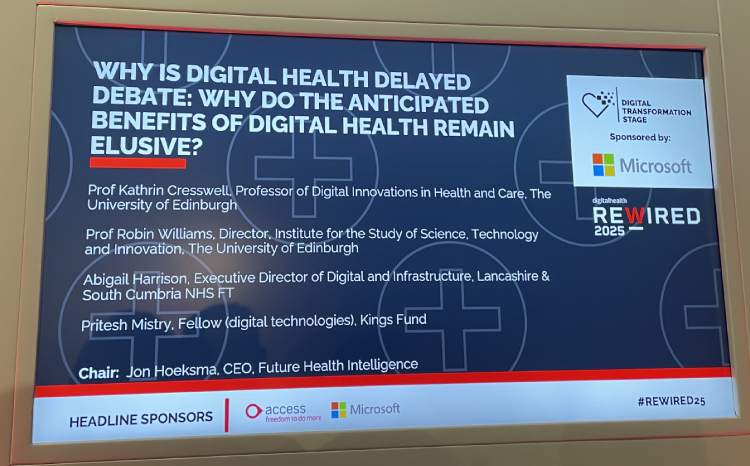BT encourages trusts to use its conferencing service
- 10 July 2007
Working across the UK health sector BT is helping to save millions of pounds each year as more and more trust sign up to conferencing solutions, which will further be enhanced by Video Conferencing soon to be available over the Health Service network.
BT Conferencing is BT’s specialist service for the delivery of robust, reliable and innovative conferencing solutions – backed up by high quality service and support. It is offered to healthcare customers in different formats at a subsidised pay-as-you-go rate.
These include audio, webcast and video conferencing, which can be used both internally or externally for any purpose, saving on travelling and time expenses usually experienced when clinicians need to communicate from different locations.
BT Conferencing’s health director, Brian Murray, told E-Health Insider: “Last year alone, using our services the health service replaced over 33,000 meetings using conferencing tools, with an average of five people on each call who would have had to commute in some way to attend. Using teleconferencing helped to save time and bring about enormous financial cost savings as opposed to travelling costs usually needing reimbursement.”
The service is used by both NHS trusts and other NHS services including the NHS Purchasing and Supply Agency, the National Blood Service, together with the telephone advice services NHS Direct in England and NHS 24 in Scotland..
Murray added: “We have calculated that NHS trusts saved in excess of £2.5m last year by using our services and avoiding travelling to and from meetings. BT Conferencing offers a much more cost-effective way of sharing information. The innovative moves towards webcasts and now video across N3 means we can be visible at the same time sharing information and viewing presentations from one room.
“For example, in one trust, three people used to travel 70-mile round trips every fortnight, which took two hours to reach and at least another hour in meetings. Their trust paid them 60p per mile, so that equates to around £252 over the year and £120 worth of time – a total of £372 per year, compared to a cost of £100 using conferencing facilities.”
Murray told EHI that vdeo conferencing is now enabled on NHS networks as the service has became quality-enabled to use the technology.
"A number of customers have been trialling video over the network and some are using it now. Trusts will not have to pay for calls using it, and in theory, it will allow them to get all of healthcare together, making often vital conferencing a lot easier, without losing the visual presence normally received at board presentations or to junior doctors during lectures."
One trust that has used BT’s MeetMe conferencing is Scarborough, Whitby and Ryedale PCT where modernisation manager, Martin O’Keeffe, uses conferencing with staff across a wide geographical area of 800 square miles.
He said: “As a PCT, we deal on a day-to-day basis with independent NHS contractors such as GPs, dentists and pharmacists. The logistics of arranging to meet with these people is difficult due to the fact that they are in surgery during office hours.
“This means that they often need to arrange evening meetings which can encroach on personal time outside of work. The use of BT MeetMe can help improve work-life-balance as it provides another option i.e. a GP can dial in whilst staying in their surgery between patient appointments or during lunch time.”
Murray added that using conferencing also helps to reduce NHS staff’s carbon footprints, which is a mandatory requirement for all trusts.
BT’s head of environment, Mike Hughes, said: “Increasingly our conferencing services are the preferred way to manage day-to-day meetings, enabling people to better manage their work-life balance and saves huge amounts of travelling with its associated costs and environmental impacts.”
Aaron McCormack, CEO of BT Conferencing, said: “The results of various surveys confirm beyond all doubt that conferencing can make a major impact towards reducing the carbon footprint of companies and their employees.
“Companies that embrace conferencing also give their people greater control of their time, increase their productivity and an improvement in work-life balance including a reduction in the amount of time spent travelling. The journeys that people avoid would have been undertaken at congested travel times, so it also frees up road space and seats on public transport.”
Murray said: “We hope more trusts realise the benefits conferencing can bring to their organisation and will be looking to demonstrate these benefits to them across the country over the next few months. We will also shortly be launching a dedicated NHS conferencing website for trusts to refer to for information and free training. There are multiple benefits to taking up this service, and though we have competitors, we aim to show that ours is the best product available to them.
“BT Conferencing has a range of products which can cater for meetings with up to 40 people to be on a conference call at one time. In healthcare, the facility is useful with at least 80% of trusts needing to dial out to people at relevant times.”




